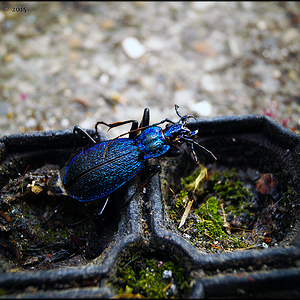Navigation
Install the app
How to install the app on iOS
Follow along with the video below to see how to install our site as a web app on your home screen.

Note: This feature currently requires accessing the site using the built-in Safari browser.
More options
You are using an out of date browser. It may not display this or other websites correctly.
You should upgrade or use an alternative browser.
You should upgrade or use an alternative browser.
Are animals moral beings...
- Thread starter JohnMF
- Start date
- Joined
- Jun 19, 2009
- Messages
- 13,661
- Reaction score
- 4,894
- Location
- In your dreams!
- Can others edit my Photos
- Photos OK to edit
- Joined
- May 1, 2008
- Messages
- 25,422
- Reaction score
- 5,003
- Location
- UK - England
- Website
- www.deviantart.com
- Can others edit my Photos
- Photos OK to edit
Humans are animals - so if we are capable of morals so are all the others
but then if they are incapable of morals then so should we be
but then if they are incapable of morals then so should we be
Josh66
Been spending a lot of time on here!
- Joined
- Oct 31, 2007
- Messages
- 14,593
- Reaction score
- 1,239
- Location
- Cedar Hill, Texas
- Can others edit my Photos
- Photos NOT OK to edit
Dolphins have been known to protect other animals/species. ...They seem to watch out for the underdog.
I also read somewhere that dolphins are the only animal other than humans known to have sex for pleasure.
I think 'morality' is mostly defined by the lack of morality. Humans are the only 'animal' I know of that will do harm to another as an act of vengeance...
I also read somewhere that dolphins are the only animal other than humans known to have sex for pleasure.
I think 'morality' is mostly defined by the lack of morality. Humans are the only 'animal' I know of that will do harm to another as an act of vengeance...
D-B-J
Been spending a lot of time on here!
- Joined
- Apr 13, 2010
- Messages
- 9,027
- Reaction score
- 2,175
- Can others edit my Photos
- Photos OK to edit
I watched a documentary about Monkey's and gorilla's, and a group of four crowded around a protected a dead member of the group in captivity, not allowing workers to remove the body for several days. And a mother also carried a dead son on her back for over two weeks. So yes, i would have to say humans are not the only "moral" beings.
Regards,
Jake
Regards,
Jake
- Joined
- May 1, 2008
- Messages
- 25,422
- Reaction score
- 5,003
- Location
- UK - England
- Website
- www.deviantart.com
- Can others edit my Photos
- Photos OK to edit
I think 'morality' is mostly defined by the lack of morality. Humans are the only 'animal' I know of that will do harm to another as an act of vengeance...
I'm pretty sure a wolf will have a good bite at you if you try to steal his lunch from him
Humans just like to brood over revenge for longer
Josh66
Been spending a lot of time on here!
- Joined
- Oct 31, 2007
- Messages
- 14,593
- Reaction score
- 1,239
- Location
- Cedar Hill, Texas
- Can others edit my Photos
- Photos NOT OK to edit
Is that really vengeance though? I mean, it sounds more like 'survival' to me - he's just trying to feed himself and/or pack/den/family, whatever they call it.I'm pretty sure a wolf will have a good bite at you if you try to steal his lunch from him
- Joined
- Jul 3, 2004
- Messages
- 3,714
- Reaction score
- 531
- Location
- Here N There
- Website
- img24.photobucket.com
Animals are so smart they don't even think about asking this question on humans.
MichiganFarts
TPF Noob!
- Joined
- Dec 22, 2010
- Messages
- 515
- Reaction score
- 41
- Location
- Northern Michigan
- Can others edit my Photos
- Photos NOT OK to edit
Animals are so smart they don't even think about asking this question on humans.
If only we could get all of life's questions answered by molested cows. I think you're input on the subject is of the uddermost importance.
mwcfarms
No longer a newbie, moving up!
- Joined
- Mar 16, 2010
- Messages
- 2,655
- Reaction score
- 179
- Location
- Southern Alberta
- Website
- www.deannachambers.com
- Can others edit my Photos
- Photos OK to edit
Morality is entirely human in definition. Personal or cultural values, code of conducts or social mores that distinguish between right and wrong. So no animals don't have morals. They have instincts. Do they have feelings and be considered sentient? Absolutely.
- Joined
- May 1, 2008
- Messages
- 25,422
- Reaction score
- 5,003
- Location
- UK - England
- Website
- www.deviantart.com
- Can others edit my Photos
- Photos OK to edit
Is that really vengeance though? I mean, it sounds more like 'survival' to me - he's just trying to feed himself and/or pack/den/family, whatever they call it.I'm pretty sure a wolf will have a good bite at you if you try to steal his lunch from him
True, but then again attack one wolf in a pack and the rest will pile onto you as well - same for many herd animals. At what point it shifts from "instinctive survival" to a moral/emotional base is totally up for debate. How much human revenge is based on more instinctive reactions
Morality is entirely human in definition. Personal or cultural values, code of conducts or social mores that distinguish between right and wrong. So no animals don't have morals. They have instincts. Do they have feelings and be considered sentient? Absolutely.
Ahh so your argument is that an animal cannot have a moral viewpoint because it lacks both culture and personal values/input. However that viewpoint makes animals out to be totally instinctive creatures - a viewpoint put out a lot during the Victorian era when humans were gods own children to many a scientist.
The thing is animals do have social groups - even going so far as to show major differences between those social groupings as well as their own internal politics within those groups as well as differences as to how the group will reactive to a given stimulation/event.
A lot of the problem is that humans don't get a good education in the wilderness/wildlife/nature side of existence. School focuses on human and human environments and ignores the wilderness save for geological forms in geography
mwcfarms
No longer a newbie, moving up!
- Joined
- Mar 16, 2010
- Messages
- 2,655
- Reaction score
- 179
- Location
- Southern Alberta
- Website
- www.deannachambers.com
- Can others edit my Photos
- Photos OK to edit
Is that really vengeance though? I mean, it sounds more like 'survival' to me - he's just trying to feed himself and/or pack/den/family, whatever they call it.I'm pretty sure a wolf will have a good bite at you if you try to steal his lunch from him
True, but then again attack one wolf in a pack and the rest will pile onto you as well - same for many herd animals. At what point it shifts from "instinctive survival" to a moral/emotional base is totally up for debate. How much human revenge is based on more instinctive reactions
Morality is entirely human in definition. Personal or cultural values, code of conducts or social mores that distinguish between right and wrong. So no animals don't have morals. They have instincts. Do they have feelings and be considered sentient? Absolutely.
Ahh so your argument is that an animal cannot have a moral viewpoint because it lacks both culture and personal values/input. However that viewpoint makes animals out to be totally instinctive creatures - a viewpoint put out a lot during the Victorian era when humans were gods own children to many a scientist.
The thing is animals do have social groups - even going so far as to show major differences between those social groupings as well as their own internal politics within those groups as well as differences as to how the group will reactive to a given stimulation/event.
A lot of the problem is that humans don't get a good education in the wilderness/wildlife/nature side of existence. School focuses on human and human environments and ignores the wilderness save for geological forms in geographyEven common highstreet shelf books and documentaries on the TV rely upon an overly simplistic display of animal actions (heck watch most on lions and you see hunts every moment - when in reality its only a few a day and the rest is spent sleeping and being social
I never said that animals didn't live in social societies I said that morality is human in definition based on cultures and social mores which are dependent on that particular culture and norms are what PEOPLE believe to be the right and wrong.
I think we can both agree that most societies of certain mammal species have similar principles or norms but do not need the so called moral values because they have simple social structures and little to no need for revenge, ambition, greed, envy or what is right or wrong. In animals social groups things either are or are not. And what you have said I agree with about social groups but we aren't talking society or sociology we are talking morality. Animals generally don't go on rampant murder sprees, or prey on the innocent weak for pleasure or fun so they don't have a superego to balance out their base ego. KWIM?
Dmitri
No longer a newbie, moving up!
- Joined
- Jun 20, 2008
- Messages
- 5,882
- Reaction score
- 44
- Location
- End of the line
- Can others edit my Photos
- Photos NOT OK to edit
What is "morality"? Whats moral to some, isn't moral to others. And vice versa.
subscuck
No longer a newbie, moving up!
- Joined
- Jun 26, 2010
- Messages
- 1,431
- Reaction score
- 191
- Can others edit my Photos
- Photos OK to edit
To look at it from a purely spiritual perspective, animals are beyond morality. They kill what they need to kill for survival (food, self defence, etc.). Predators keep the animal population healthy and in check by weeding out the old, sick, and a number of young which ensures survival of the herd but at a level that's sustainable by the resources in their geographic area. Scavengers play their role in keeping the area clean, so to speak. In short, animals fulfill their place in the scheme of things perfectly and as they were intended to do. Morality is only applicable to humans as we kill, hurt, injure, etc., out of sport, emotion, mental defect, etc.
- Joined
- May 1, 2008
- Messages
- 25,422
- Reaction score
- 5,003
- Location
- UK - England
- Website
- www.deviantart.com
- Can others edit my Photos
- Photos OK to edit
I never said that animals didn't live in social societies I said that morality is human in definition based on cultures and social mores which are dependent on that particular culture and norms are what PEOPLE believe to be the right and wrong.
I think we can both agree that most societies of certain mammal species have similar principles or norms but do not need the so called moral values because they have simple social structures and little to no need for revenge, ambition, greed, envy or what is right or wrong. In animals social groups things either are or are not. And what you have said I agree with about social groups but we aren't talking society or sociology we are talking morality. Animals generally don't go on rampant murder sprees, or prey on the innocent weak for pleasure or fun so they don't have a superego to balance out their base ego. KWIM?
But animals do have an ego - you'll see this most often in pack species (which we also are) where a dominant alpha will reinforce their dominance through displays and, when needed, applications of more violent manners. Humans do much the same thing. I would say that our ability to remember specific events is probably greater than many other animals which I think adds to the viewed "complexity" of our actions because we'll choose another time to react and remember to react at that time - whilst many other animals will deal with things up front and in the moment more often (though not always).
Further we should not take this to view that other creatures can't predict and pre-plan - an ape in a local zoo was shown to do this by arranging rocks in advance of people arriving (and then using the rocks as missiles to throw at them - he didn't like people
I think this argument tends to end up circuling around the "right and wrong" area where its simple to say that animals don't have right and wrong like we do - yet start a debate about what is right and wrong and you hit a massive wall of confusion half the time. We seem to know what we mean but we never really have a perfect answer - possibly because we might not have right and wrong in the way we think we do.
To look at it from a purely spiritual perspective, animals are beyond morality. They kill what they need to kill for survival (food, self defence, etc.). Predators keep the animal population healthy and in check by weeding out the old, sick, and a number of young which ensures survival of the herd but at a level that's sustainable by the resources in their geographic area. Scavengers play their role in keeping the area clean, so to speak. In short, animals fulfill their place in the scheme of things perfectly and as they were intended to do. Morality is only applicable to humans as we kill, hurt, injure, etc., out of sport, emotion, mental defect, etc.
Animals will do things out of emotion as well. They have been shown to clearly show such emotions as stress (parrots plucking feathers); anger (pack species defending the pack); mental problems (yep animals get them too - both as a result of breeding upbringing); sport - well cats and killer whales will happily play with food and even choose not to eat that food after play provided that they have sufficient food not to be desperate for the next meal.
Animals will also overkill if they can - many predators go into kill frenzies when they hunt; mostly to ensure that they will kill something in the attack. When this happens (oft on captive and movement constricted animals) they can kill far more than they will eat - even if they were to put the food into storage in hidden spots.
The balance they achive however that humans fail to, is mostly a byproduct of the fact that they both have to risk their own life in hunting and also switch prey species as the food becomes more rare. If they predate on one species that becomes fewer in number they have to shift to another otherwise they won't find enough to survive. The difference is that humans have a stable food source (farming) which allows us to spend far more resources (time; energy) in hunting that one last dodo for the table*. Further we also hunt in manners that put us at far less personal risk and also increases our chance for a kill - many predators actually fail far more than they succeed (we just see the good kills on the BBC and the like because it gets the views) whilst humans shift the balance a lot more in our favour - and as such are the only species currently capable of overkilling to the point of actively removing our own food source from the ecosystem.
* they now think dodos might have been killed by cats brought over on ships or by rats going after their eggs rather than overhunting - because apparently they didn't taste all that nice. However many people still see it as a human overhunting example so I used it here in that context alone even though it might no longer be factually true to do so
Similar threads
- Replies
- 66
- Views
- 5K




![[No title]](/data/xfmg/thumbnail/32/32809-afb9514cb8c02e2e41c241946e185251.jpg?1619735668)








